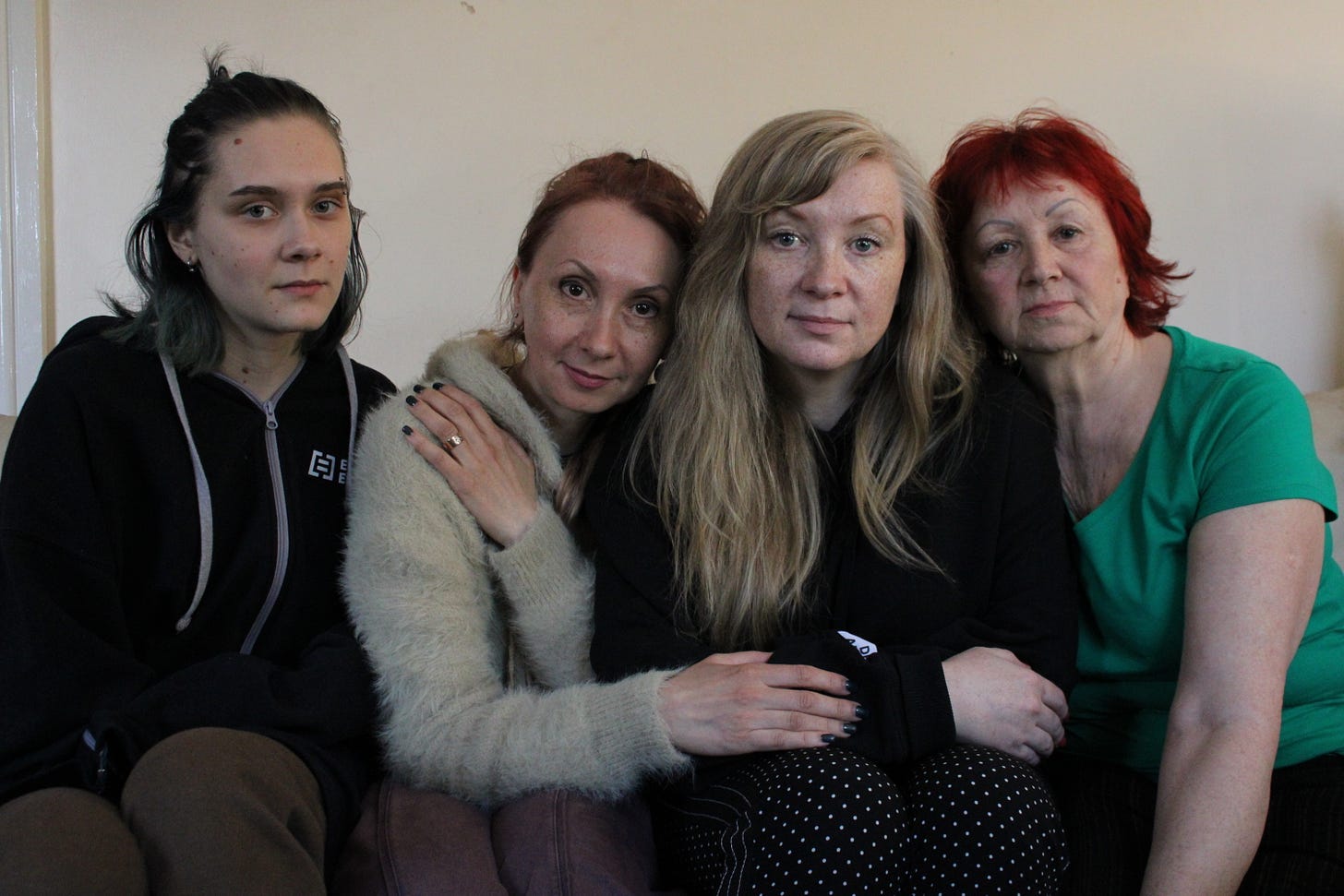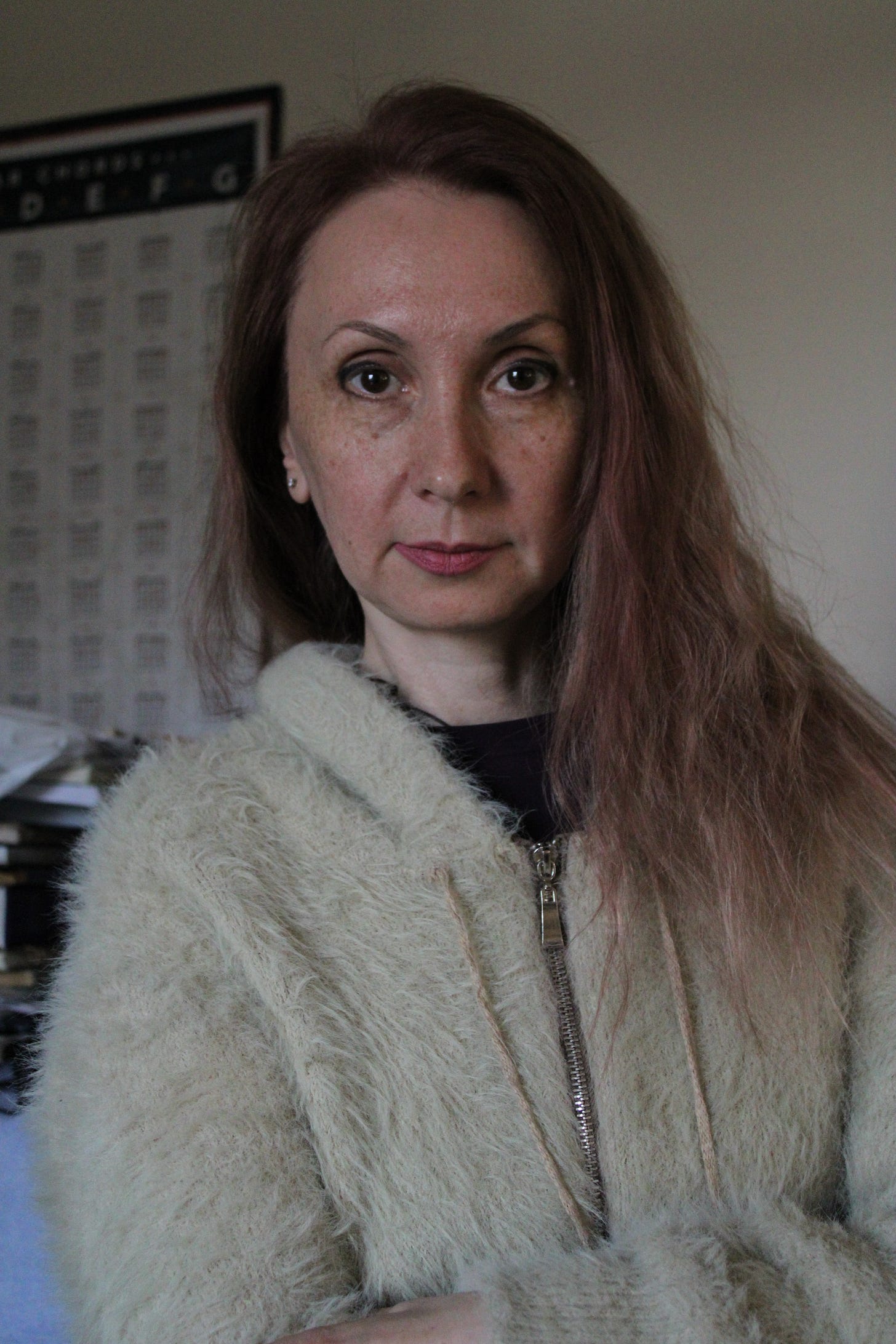Escaping war, longing for home
Freshly arrived from Ukraine, three refugees start their lives anew in Manchester
By Jack Dulhanty
“We’re here for the biometric cards?” Kateryna said to the face behind the post office glass. She was asked for passports and had them handed back to her with shimmery pink biometric residence permits slotted inside. Liubov, Olena and Darina stood in a gaggle behind her. “Are you all staying at the same address?” The post office clerk wanted to know.
“Yes.”
The four of them headed to the exit and stopped in the block of sunlight falling through the open doorway. They laughed at the photos on their permits, which were taken when they arrived in Poland: ghostly skin, sunken eyes, greasy hair. “They look like arrested terrorists,” Kateryna laughed. Their right to reside and work in the UK had been granted, but there wasn’t much fanfare. The permits and passports were slipped back into the embroidered leather passport carrier that Kateryna had brought them in, and they headed for the car. Next on the list was to register with the GP.
It had been exactly a month since the war in Ukraine had started, and since bombs first fell on Liubov, Olena and Darina’s home in Kharkiv, in the east of the country. I had first heard about their journey from Kateryna, who lives in Manchester, at a Saturday School for Ukrainian kids in Cheetham Hill. (Liubov is Kateryna’s mother, Olena her sister and Darina her niece).
The war had started on Kateryna’s birthday, and ever since she received the message: “Happy Birthday, we’ve got a war here,” she had been orchestrating her family’s escape from afar. Kateryna and I had been in regular contact about their progress and since Kateryna translated my original piece into Ukrainian for Liubov, she had been asking to speak to me.
We left the post office and bundled into Kateryna’s car — “the air conditioning doesn’t work so, sorry about that.” Darina, whose shock of blue-green hair was poking out of her beanie, filmed on her phone as the city scrolled past the window. She worries about her friends from university, many of whom are still in basements around the country or unaccounted for.
But it isn’t just her friends, her father Dmytro is also there: "I try to keep in touch with him,” she said, “he helps people as a volunteer.” It was Dmytro who organised for them to get to Kharkiv railway station. It had been about a week since the war started by then, and the three of them had been living in the basements, garages and spare rooms of friends and neighbours, often sleeping upright under drifts of blankets and winter coats.
"When we first heard bombing, we were at home, it was about 4 or 5am,” Darina told me. “We didn't believe it, even though I packed my things before because I knew something may happen. I had a rush of adrenaline and I started doing push-ups to try and get rid of it." Liubov was the first to be woken by the sounds, and could see fire in the distance from her window. She roused the others, and then woke up their neighbour.
First they moved into a basement beneath a neighbour’s garage, two-by-two metres shared by five people. They didn’t stay long. On going up to get some air, Darina discovered two Russian tanks parked outside. The family lived on Kharkiv’s eastern fringe, and the motorway that they lived beside was a direct route to the nearest Russian town over the border. They surmised that, as more tanks and troops came to Kharkiv, they’d be first in their path. "It felt like we were on display, with no defence,” Liubov said.
They moved to another basement under another garage, where they stayed for four nights. Then they returned to the basement beneath their apartment building, during which time that building was shelled.
Eventually, they arranged to stay at the home of one of Darina’s classmates. When the classmate’s parents arrived to pick them up, they ran to the car. As she ran, Darina saw the craters in the surface of the road and will have seen the burnt-out husks of cars that were parked outside the complex. As she told me, she sometimes asked Kateryna to translate single words she hadn’t learnt in English yet.
“I saw…” then Darina would say something in Ukrainian to Kateryna.
“Holes,” Kateryna said, glancing into her rear-view mirror, “in the ground.”
“Also, I saw two, er,” again, something in Ukrainian to Kateryna.
“Puddles.”
“Puddles?” I ask.
“Of blood.”
We arrived at the GP. Registering was a cinch. Kateryna’s son, Mykhaylo, has a friend working on the reception there. “If you need anything else, tell Mykhalo to let me know and I’ll sort it,'' she said.
Afterwards, Kateryna sat in the car to take a call for work, she’s been working throughout this time. The others and I stayed outside. “It was three or four thousand hryvnia (about £100) to get to the railway station,” said Darina, explaining how the prices for taxis to the railways, a prized but risky journey, were being gouged. They’d heard of people paying 10,000 hryvnia (about £250) to get to stations. That’s nearly twice the average monthly salary in Ukraine.
Dmytro was volunteering to drive people to safer areas and deliver food to those who couldn’t leave basements — often the elderly and very young. He arranged for them to be driven to Kharkiv railway station, from the classmate’s house. They ran from the house to the car, traversing fallen trolleybus and electric lines. Once at the station there was little time to say goodbye. Darina kissed her father on the cheek before he left. She hadn’t cried much during the war — “the situation is so harsh that you have no time to cry” — but she did then.
“Shall we go back for some tea?” asks Kateryna, who had finished her call. We got in the car and headed back to her flat, where the four of them now live together. There, Kateryna has her father’s old guitar — “to have a guitar during the Soviet times was very cool” — and lots of Harry Potter books translated into Ukrainian.
By some providence, they got a train within a few hours of arriving at the station. Olena remembers stepping onto the train’s step as it was about to leave. She turned expecting to see Darina and instead saw a woman with a dog on a leash struggling onto the step, with Darina waiting anxiously behind her. “I nearly killed that dog, pulling it onto the train,” Olena tells me with Kateryna translating.
It took 26 hours to get to Lviv, then there was a four-hour wait to get into the station. Liubov and Olena were standing for the majority of that time, with Darina sleeping on a luggage rack. Sometimes, when other passengers had fallen asleep, Liubov would sit on the edge of their seats, hoping not to wake them. Telling me this, her eyes glitter with tears, so too do Kateryna’s as she prepares to translate. "But overall people were very nice,” she says, “sharing sweets and tangerines and whatever they had so everybody could have a little." Passengers even shared some pâté with the dog Olena helped drag on board.
Their memories of the journey are punctuated by moments of kindness. The American man in Kraków who handed them 20-dollar bills attached to printed-out prayers. The young dentist in Warsaw, Mr. Kikowicz, who had just opened his practice and gave them dental treatment with a 60% discount so they didn’t have another thing to do when they arrived in the UK. The people at TK Maxx who gave Kateryna money to replace the winter clothes her family had arrived in, the same clothes they wore as they slept in Kharkiv basements, the luggage racks of Lviv-bound trains and the seats of Manchester-bound planes.
Now, life is focused on what to do next. Olena, a hairdresser, only had time to pack one pair of scissors and a comb. She and Liubov are looking for ESOL classes, with a view to find work, mostly to distract from the anxieties that followed them from Ukraine (each of them describes the dreams they still have of war: the sounds of whistling shells, becoming trapped beneath crushed buildings, Russian soldiers with the faces of friends).
Darina’s computer linguistics course at The Kharkiv Polytechnic Institute was interrupted by the war. Remarkably, her teachers are trying to figure out a way for her to learn remotely, Kateryna’s work are sourcing a spare laptop for her to use. Darina wants to work in artificial intelligence and has plans to develop an app — with Kateryna’s boyfriend, a software engineer — to help displaced people find one another and access resources. "This project would be nice for getting her into development and seeing if that's something she'd be interested in,” says Kateryna.
But there’s still an undercurrent of homesickness. Liubov and Olena especially, talk about the sense of being uprooted, a sort of listlessness as they wait for their home to escape the grips of the fighting: "We're worried about the people still in the basements, the volunteers delivering aid. But we also want Ukraine to win — so we can go back home,” says Liubov.
We finish our tea and take portraits. Olena has hers done with her hair up and down — and gives me clearance to use the ones with her hair down — she is a hairdresser, after all. It’s once the interviews are over that they fall back into their rhythms, Darina sat at the dining table on her phone, Olena lounging and doing the same, Kateryna tapping at a keyboard and Liubov just sitting, watching Kateryna. They agree they have found physical peace, safety, but no peace of mind.
Next year, the four of them will all share milestone birthdays — all, except Kateryna’s, in the month of May — I’m told the ages they are turning, but they are under strict embargo. For hers, Liubov had always said she would visit the castles of Ukraine; there are some 5000 fortifications, many from the 13th and 14th century, dotted around the country. I ask if she thinks she’ll be able to. She doesn’t know. If she is home at all by then, that would be enough.









This morning I was complaining about a couple of hours wait at Manchester airport to go on holiday.
I've just read this and it's put that in completely perspective.
Thanks Jack, I hope the ladies find peace of mind soon. So difficult for them and everyone that have had to leave loved ones behind. Welcome to Manchester ❤